By Francisco Lim and Eric Recalde,  ACCRALAW
ACCRALAW
E: felim@accralaw.com
E: errecalde@accralaw.com
 The Philippine Competition Commission is taking strides towards a competition law regime that is responsive to business while still promoting competition
The Philippine Competition Commission is taking strides towards a competition law regime that is responsive to business while still promoting competition
The state of Philippine competition regulation has been slowly taking shape barely over two years after the passage of the Philippine Competition Act (RA 10667). Since the effectivity of the law in August 2015, the Philippine Competition Commission (PCC) has taken stride towards its full implementation. ACCRALaw for its part has actively participated in developing a competition law regime that is responsive to business and at the same time promoting competition, as envisaged in the law.
Just like the competition regulation of other jurisdictions, the Philippines regulates and/or penalises whatever form of anti-competitive acts of persons and entities that have effect on Philippine competition, be that in the form of agreements, abuse of dominant position or mergers and acquisitions (M&As).
Immediately following its formation in February 2016, the PCC issued transitory circulars to provide guidelines on how to treat M&As covered by the mandatory notification for merger control review under the law. These circulars were meant to address uncertainties in the M&As pending the issuance of the law’s implementing rules and regulations (IRR). Four months later, the PCC finally issued the IRR. Essentially, the IRR spelled out the notification thresholds and the procedure for the two-phase merger control review. To supplement the IRR, the PCC issued Merger Review Guidelines on substantive merger analysis, and a few clarificatory notes. Currently, it is deliberating on a Merger Procedure that will set in a more detailed fashion the rules for the two-phase merger control review, taking into account its experiences and issues encountered for the past year. Through its interactions, ACCRA has actively assisted PCC in crafting such procedure in a manner that will avoid delay in the conclusion of M&A transactions and at the same time permit the PCC to adequately review them.
It will be noted the IRR did not provide details or guidelines on when an act may constitute as anti-competitive agreement or abuse of dominant position. Based on prior consultations, the PCC intimated it will not provide those details or guidelines and will rather evaluate the act considering the broad parameters set in the law (and reiterated in the IRR) and, presumably, the interpretations of other jurisdictions. Nevertheless, the PCC has recently issued its Rules of Procedure in the investigation and hearing of purported anti-competitive agreements and conduct of persons and entities, their remedies and sanctions that may be imposed on them.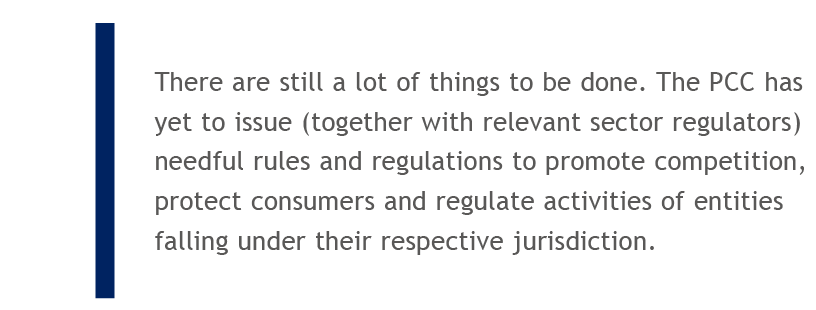
In light of the mandate of the law to assist the National Economic Development Authority (NEDA) in preparing and formulating a national competition policy, the PCC has started consultations with various sectors. Francis Lim, a senior partner of ACCRA, has assisted the PCC in this endeavour. In particular, we pointed out the various provisions of the constitution, laws and various government regulations that serve as roadblocks to free competition and need to be revisited and, if necessary, modified or recalled. One of these is the regulations of the Philippine Contractors’ Accreditation Board limiting the participation of foreign contractors in construction activities in the Philippines. The PCC, noting that such regulations have no explicit legal basis, has intervened in a pending case before the Supreme Court and requested for the declaration of invalidity of the said regulations.
Shortly after the issuance of the IRR, we published a book entitled The Philippine Competition Act: Salient Points and Emerging Issues. We anticipated that the law, at its infancy stage, will give rise to several issues, which we pointed out in our book and gladly shared with PCC. The officals will likely guard the PCC’s prerogatives, specifically the robustness of its authority to interpret the law, conduct investigations and review M&As. On the other hand, as private practitioners, we in ACCRA endeavour to protect our clients based on our understanding of the law and if necessary to take an advocate’s position relative to a point of law as applied to a particular set of circumstances. Mutual respect and openness are essential in this case.
For example, in relation to the timing when the merger notification should be made, the law does not specifically provide guidance. It only forbids parties to a notifiable transaction “from consummating their agreement until 30 days after providing notification to the Commission in the form and containing the information specified in the regulations issued by the Commission”. In the IRR, the PCC requires the parties “to notify the Commission before the execution of the definitive agreements relating to the transaction”. It has later explained by way of a Clarificatory Note that definitive agreements may refer to “a share purchase agreement, asset purchase agreement, joint venture agreement or other similar agreement”, and parties may notify on the basis of a binding preliminary agreement, such as “a memorandum of agreement, term sheet or letter of intent”. This naturally caused some difficulty for some especially those who were involved in a global deal, wherein the global definitive agreement was signed before filing with the prescribed notification for each jurisdiction. While there were certain jurisdictions that recognised notification pre-execution of definitive agreement, parties in those cases were only given the option to make such notification to avoid delay in the closing of the transaction. They were not mandated to immediately make such notification. If they wish, they can do so post-execution of the definitive agreement but before consummation of the underlying transaction. ACCRA pointed this out in previous interaction with PCC and formally presented by way of comment on the draft Merger Procedure, which as mentioned was still under consideration by the PCC. We understand that the PCC based on its exposure draft would soon permit the parties to file notification within a certain period following the execution of the definitive agreement. The parties’ failure to notify within the prescribed period following execution of the definitive agreement will merit sanctions but not the same sanction should they proceed and consummate the agreement without the PCC approval. It will be the latter scenario when the heftier 1-5 percent penalty (based on the value of the transaction) prescribed by law will apply. These demonstrate the openness of the PCC to suggestions and resolved to adopt a business-friendly procedure in the discharge of its mandate to review M&A transactions.
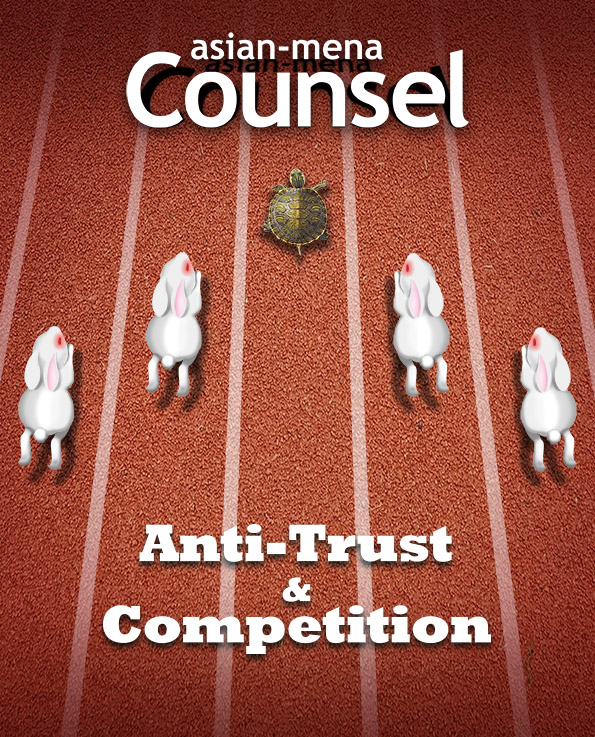 There are still a lot of things to be done. The PCC has yet to issue (together with relevant sector regulators) needful rules and regulations to promote competition, protect consumers and regulate activities of entities falling under their respective jurisdiction. It has not yet promulgated other criteria that may be applied to a sector or across some or all sectors that will likewise trigger merger notification, or has yet to stipulate an increased transaction value threshold. For some, the existing notification threshold of P1 billion is too low, in light of the increased values of Philippine transactions. It has not also fully demonstrated how it would protect confidential business information gathered during its investigation. Its ability to protect such information is a major concern for some of the parties in an M&A transaction that makes them hesitant providing them in the course of investigation. We understand that the PCC is in the process of providing a secured record keeping system to allay this concern of parties under investigation.
There are still a lot of things to be done. The PCC has yet to issue (together with relevant sector regulators) needful rules and regulations to promote competition, protect consumers and regulate activities of entities falling under their respective jurisdiction. It has not yet promulgated other criteria that may be applied to a sector or across some or all sectors that will likewise trigger merger notification, or has yet to stipulate an increased transaction value threshold. For some, the existing notification threshold of P1 billion is too low, in light of the increased values of Philippine transactions. It has not also fully demonstrated how it would protect confidential business information gathered during its investigation. Its ability to protect such information is a major concern for some of the parties in an M&A transaction that makes them hesitant providing them in the course of investigation. We understand that the PCC is in the process of providing a secured record keeping system to allay this concern of parties under investigation.
In relation to its mandate to investigate anti-competitive acts, the PCC is currently evaluating the actions of certain industry players. Apparently, these entities failed to rectify their practices within the two-year transition period to align with the law. This ended in August this year. This is the reason why the PCC recently issued its Rules of Procedure, as mentioned earlier, to provide guidance to parties under investigation of their rights and remedies. The same rules likewise spell out the specific administrative fines. Specifically, the basic fine for an anti-competitive act is up to 30 percent of the relevant turnover, unless the entity does not compete in the relevant market in which case the rate is reduced to 20 percent. This basic fine may be adjusted to arrive at the final fine, depending on the existence of aggravating or mitigating factors cited in the rules. The final fine will be tripled if the violation involves the trade or movement of basic necessities and prime commodities. In the interest of fairness and equity, the rules explicitly recognise the authority to depart from the above-described methodology of setting the fine.
It is also likely that the PCC will soon revisit the 50 percent market share threshold giving rise to a presumption of market dominance in evaluating conduct of entities under investigation. In such a case, the PCC is mandated to “consider the structure of the relevant market, degree of integration, access to end-users, technology and financial resources, and other factors affecting the control of a market”. However, it is still not settled whether the PCC can lower or is only permitted to increase the 50 percent threshold. The congressional deliberations are not very helpful on this issue. Active discussion on PCC’s authority to increase the threshold does not necessarily imply the absence of its authority to lower such threshold. This is crucial since a lower threshold raises the presumption of market dominance, and opens itself to investigation whether its actions may be regarded as abuse of such dominance as mentioned in the law. This imposes a burden on the concerned entity to dispute such presumption taking into account the factors mentioned in the law. A related issue is whether the list of acts deemed to be in abuse of dominant position cited in the law is exclusive or merely illustrative. A plain reading of the law suggests it is. However, the IRR shows the list is only illustrative, and does not rule out other actions that may be considered in conflict with law. Congressional deliberations appear to support the position taken in the IRR.
In such a short period of time, the PCC has done a lot. At the rate it is going, it is apparent the PCC will soon take the above measures in order to fully implement the law. It is the job of the regulated persons and entities to do their share by adjusting their actions to align with the law. They should likewise bring to the attention of PCC, with assistance of advisers like ACCRA, the actions and interpretations of PCC that they consider to be excessive or too cumbersome to business.
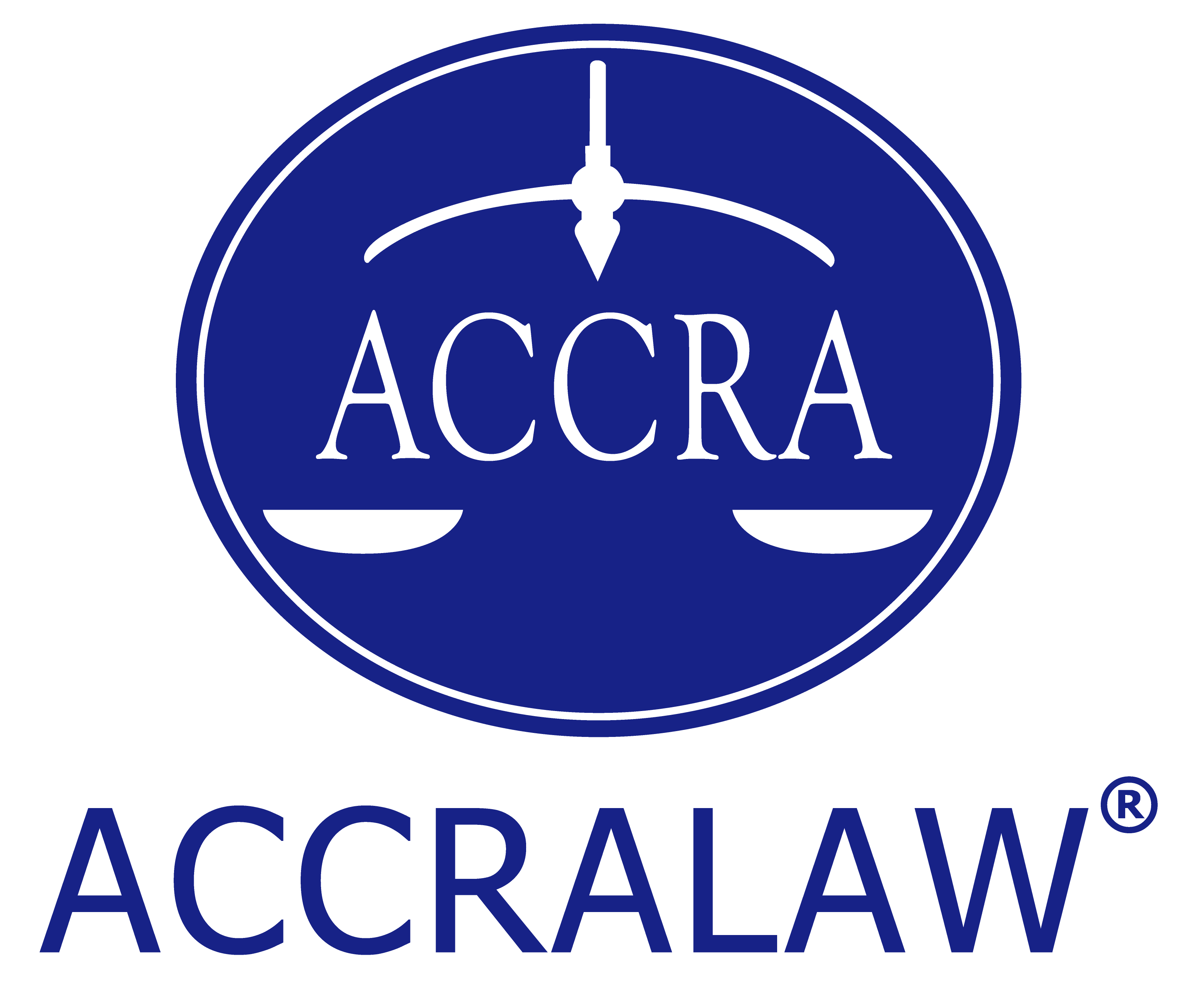





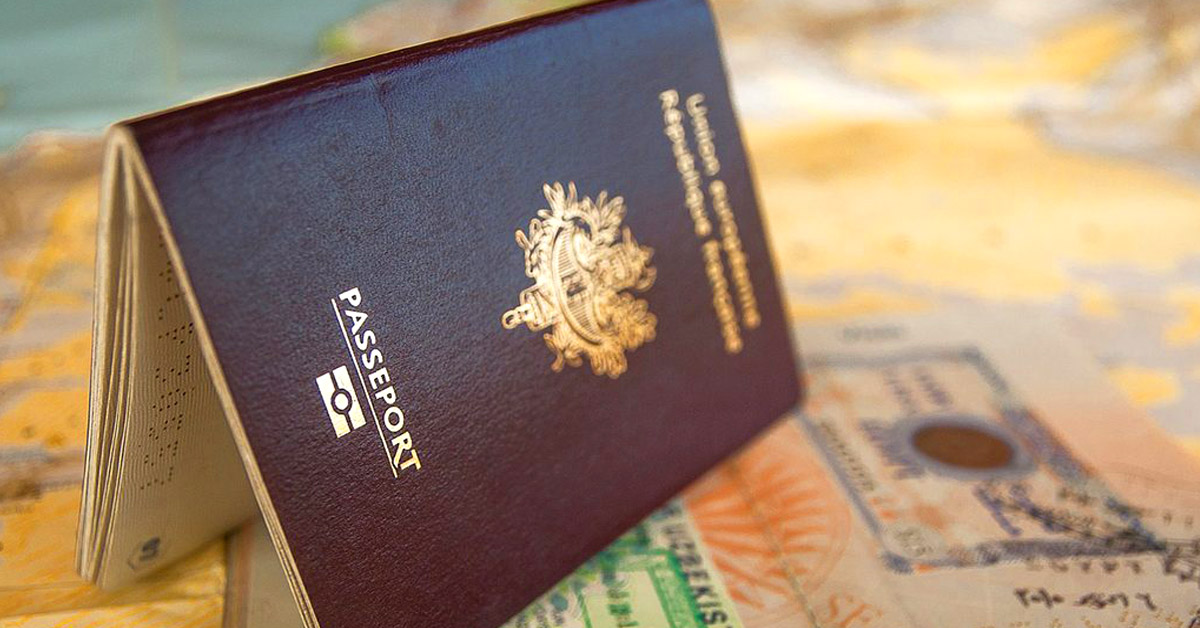
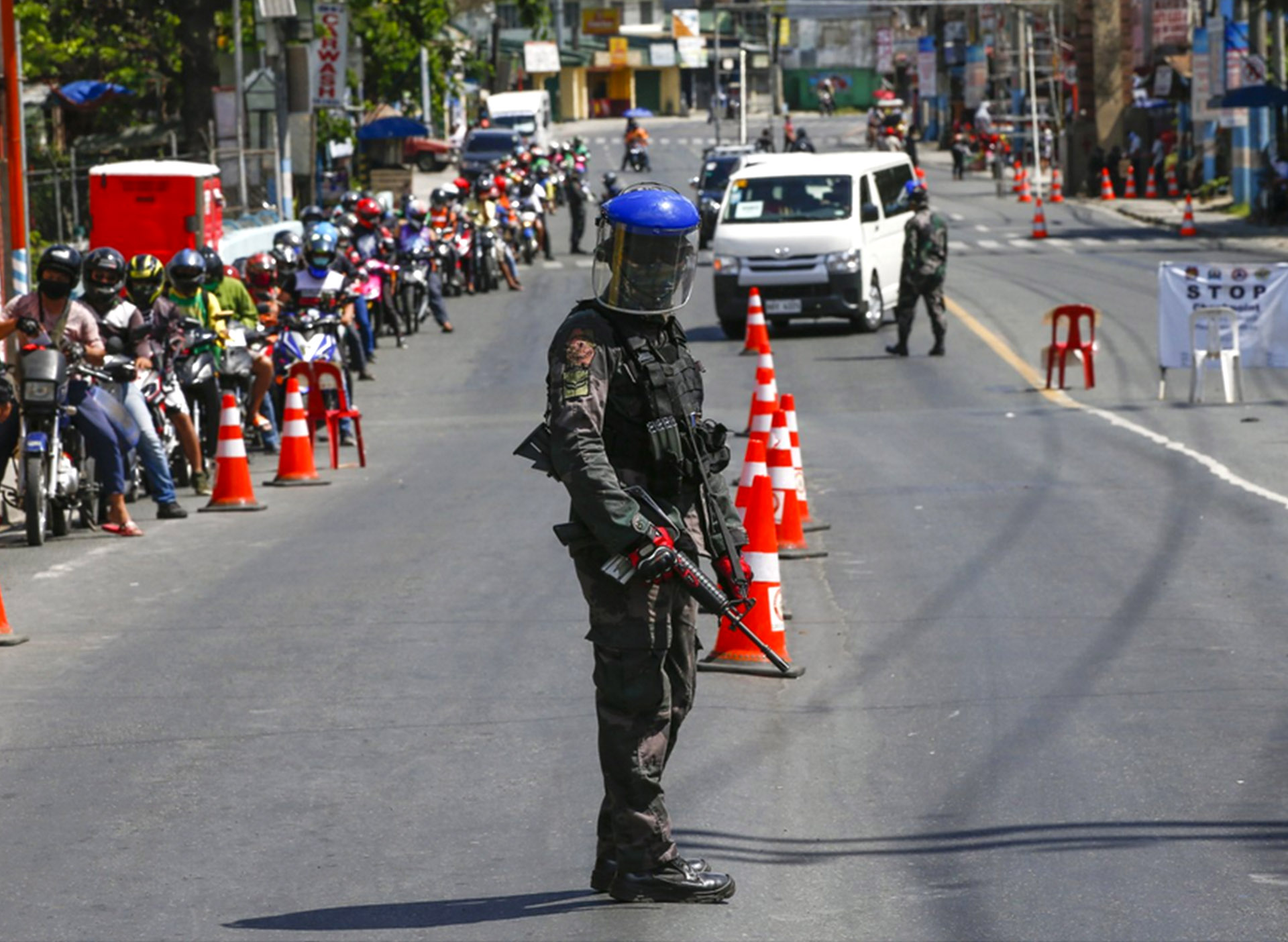












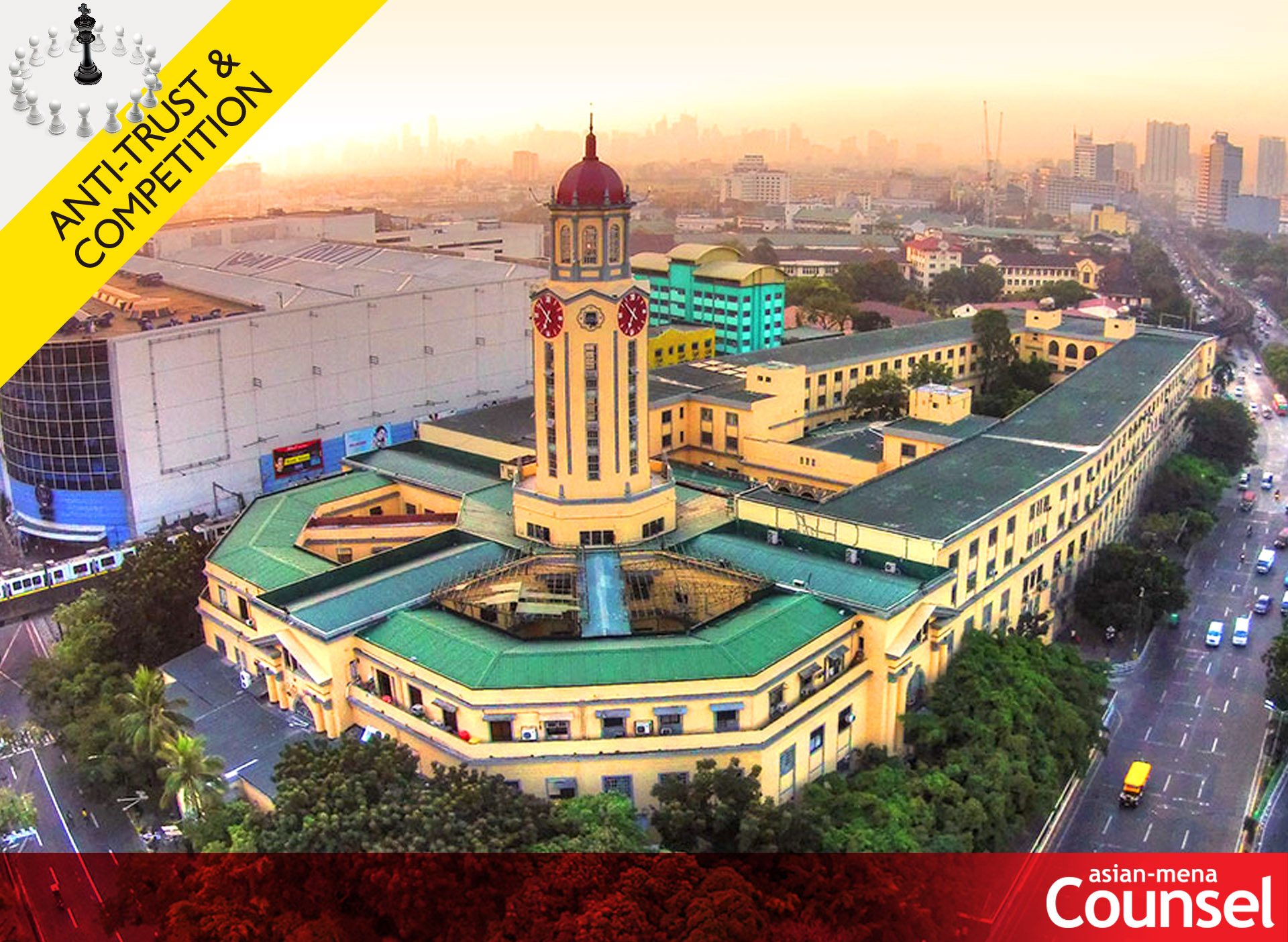






















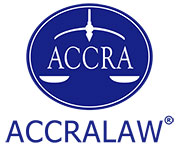 Angara Abello Concepcion Regala & Cruz Law Offices (ACCRALAW)
Angara Abello Concepcion Regala & Cruz Law Offices (ACCRALAW) Emerico O. De Guzman
Emerico O. De Guzman







